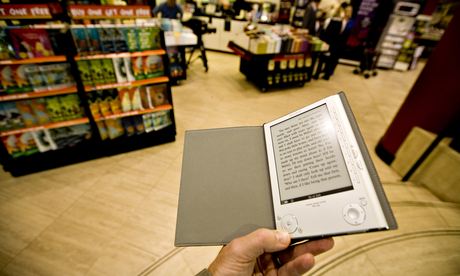Tim Waterstone's claim that ebooks are in decline isn't persuasive – and there are far more urgent matters for readers to discuss

Time to turn the page … an ebook reader in Waterstones. Photograph: Martin Argles for the Guardian
The digital revolution is going into a decline, Tim Waterstone told the Oxford literary festival. Well, it's an attention-grabbing statement, ideally suited to our culture of assertive headlines, but it's probably not true. That's not to say that the rapid growth of digital will necessarily continue, either, certainly not in markets that are already saturated with handheld devices.
Why? Because the future is – as William Gibson told us quite a long time ago now – not evenly distributed. In fact, if one thing is ubiquitous these days it would seem to be liminality. Everywhere is an in-between place. For example, even in fairly remote bits of Kenya an SMS-based information service called iCow provides farmers with veterinary advice tailored to each of their animals, including reproductive calendar reminders, feeding schedules and market information.
There are fewer and fewer venues where digital technology has made no impact – and where there's a digital device, there are ebooks, at least in potential. They need not be anyone's primary method of consuming literature, but in some situations they will be the best one. Rather than circling the wagons as other media industries did (to no good outcome, it has to be acknowleged) publishers need to learn the more recent lessons from music and film and consider, for example, providing digital copies as standard with hardback editions.
More
Why? Because the future is – as William Gibson told us quite a long time ago now – not evenly distributed. In fact, if one thing is ubiquitous these days it would seem to be liminality. Everywhere is an in-between place. For example, even in fairly remote bits of Kenya an SMS-based information service called iCow provides farmers with veterinary advice tailored to each of their animals, including reproductive calendar reminders, feeding schedules and market information.
There are fewer and fewer venues where digital technology has made no impact – and where there's a digital device, there are ebooks, at least in potential. They need not be anyone's primary method of consuming literature, but in some situations they will be the best one. Rather than circling the wagons as other media industries did (to no good outcome, it has to be acknowleged) publishers need to learn the more recent lessons from music and film and consider, for example, providing digital copies as standard with hardback editions.
More
No comments:
Post a Comment